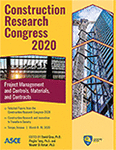Construction Research Congress 2020
Evaluation of Construction Surety Bonding Criterion for Changing Economic Conditions
Publication: Construction Research Congress 2020: Project Management and Controls, Materials, and Contracts
ABSTRACT
Changing economic conditions have created uncertainty in the construction industry. Developers, construction companies, and sureties are all sensitive to the potentiality of failure and subsequently the need to manage financial risk. Over the last 15 years, many have observed economic growth, recession, recovery, and growth again. In this same time period many have also observed change in the surety market. As construction firms seek to expand, the demand for performance and payment bonds increases. Economic growth periods pose an interesting dynamic for sureties to anticipate risk and the next economic downturns. The purpose of this study is to investigate the bonding requirements in changing economic conditions in regards to the bonding standards during downturns and booms in the economy. Interviews were held with sureties to collect information on bonding criterion used during these economic conditions. The outcomes show that differences exist from one economic condition to another, while important surety bonding criterion are identified. Sureties become more risk averse during negative economic change, but sureties are also more willing to take on more risk during positive economic changes. Understanding the changing nature of bonding requirements helps construction companies prepare financial risk management strategies for varying economic conditions.
Get full access to this article
View all available purchase options and get full access to this chapter.
REFERENCES
Beyers, W. B. (2013). “The Great Recession and State Unemployment Trends.” Economic Development Quarterly, 27(2), 114-123.
Bureau of Economic Analysis (2018). Measuring the Nation's Economy.
Gibbs, G. R. (2007). “Thematic coding and categorizing.” Analyzing qualitative data, 703, 38-56.
Greene, M., Aleman, E., Christopher, C., Graboyes, House S., Jankowski, P., Saporta, D., and Wade, H. (2019). "Economic Policy Survey." National Association for Business Economics, Washington, D.C., February.
Hillebrandt, P. M., Cannon, J., and Lansley, P. (1995). The Construction Company in and out of Recession, Macmillan, London.
Kakkad, S.A. (2017). Business Survival in the Construction Industry in Relation to Other Businesses: A Comparative Analysis. Master's thesis, Texas A & M University. Retrieved from: <http://hdl.handle.net/1969.1/161347>
McIntyre, M., and Strischek, D. (2005). “Surety bonding in today’s construction market: Changing times for contractors, bankers, and sureties.” The RMA Journal, 31-36. Retrieved from: <https://suretyinfo.org/pdf/TodaysMarketMay05.pdf>
O’Leary (2010). The great recession: Will construction workers survive?, Time Magazine, February. Retrieved from: <http://content.time.com/time/nation/article/0,8599,1960639,00.html>
Peiffer, E. (2015). “The neglected bellwether of industry stability: Fluctuating number of construction firms.” Construction Dive, June, Retrieved from: <https://www.constructiondive.com/news/the-neglected-bellwether-of-industry-stability-fluctuating-number-of-const/400125/>
Russell, J. S. (1990). "Surety industry: overview." ASCE Journal of Management in Engineering 6(3), 323-341.
Tansey, P., Spillane, J. P., and Xianhai, M. (2014). "Linking response strategies adopted by construction firms during the 2007 economic recession to Porter’s generic strategies." Construction management and economics 32(7-8), 705-724.
Information & Authors
Information
Published In
Construction Research Congress 2020: Project Management and Controls, Materials, and Contracts
Pages: 535 - 544
Editors: David Grau, Ph.D., Arizona State University, Pingbo Tang, Ph.D., Arizona State University, and Mounir El Asmar, Ph.D., Arizona State University
ISBN (Online): 978-0-7844-8288-9
Copyright
© 2020 American Society of Civil Engineers.
History
Published online: Nov 9, 2020
Authors
Metrics & Citations
Metrics
Citations
Download citation
If you have the appropriate software installed, you can download article citation data to the citation manager of your choice. Simply select your manager software from the list below and click Download.
